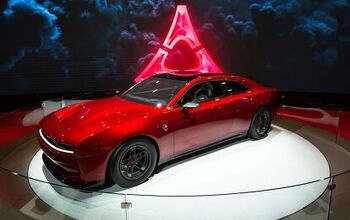Mitsubishi Doomsday Clock - When Do We Start Counting? UPDATE: Right Now.

UPDATE: Mitsubishi has officially announced they will close the Normal, Ill. plant and are looking for a “strategic buyer.” This article was originally written a couple of hours before the announcement. Our Mitsubishi Doomsday Countdown starts right now, putting Mitsubishi’s Best-Before Date at Tuesday, January 16, 2018.
When Suzuki decided to stop building their last self-produced model in North America, the seven-seater XL7, in the midst of the U.S. economic crisis, it was just another nail in the coffin for that looked to be inevitable — the end of Suzuki sales in North America.
The CAMI plant in Ingersoll, Ontario, Canada — a plant that still cranks out GM products to this day — was an integral part of Suzuki’s success and ultimate demise. Much like the Normal, Illinois Mitsubishi facility, the CAMI plant started as a joint venture between General Motors and its new Japanese BFF.
General Motors, like Chrysler, wanted to leverage product from Japanese automakers. Chrysler went after sports cars while GM affixed the badges of many brands — Chevrolet, GMC, Pontiac, Geo, Passport and Asuna — to the grilles of Sidekicks and Swifts to sell on the lots of its own dealers.
The CAMI plant gave Suzuki a local presence. People bought the Sidekick and its GM-badged brethren in droves — right up until the point they didn’t.
Suzuki, too little and too late, cut its ties with CAMI on May 12, 2009. However, the Normal story is a fair bit different, as it wasn’t Mitsubishi to pull out of the joint venture. In 1991, Chrysler divested part of its share in the joint venture and plant, giving Mitsubishi overall management control. Two years later, Chrysler would sell the remainder of Diamond-Star Motors to Mitsubishi, effectively ending the formal joint-venture partnership. DSM ceased to exist in 1995 when the joint-venture company was renamed Mitsubishi Motor Manufacturing of America.
For Suzuki, it took 907 days after the end of manufacturing before the company packed it in for good in the U.S.
During the economic crisis, I was one of the many who also predicted the end of Mitsubishi in America.
Today, I’m not so sure.
Mitsubishi is making gains in sales, even if those gains are mostly on low-margin products. Also, there is a fair amount of new product on the horizon if the rumor mill is to be believed, and it could prop up the small Japanese automaker long enough to sort out its issues before the next inevitable recession.
Maybe.
Will Mitsubishi meet the same fate as Suzuki? Are we in for a 907-day wait before its ultimate end? We will see. If/when Mitsubishi makes a formal announcement on the future of Normal, we will start the clock.

More by Mark Stevenson
Latest Car Reviews
Read moreLatest Product Reviews
Read moreRecent Comments
- Honda1 Unions were needed back in the early days, not needed know. There are plenty of rules and regulations and government agencies that keep companies in line. It's just a money grad and nothing more. Fain is a punk!
- 1995 SC If the necessary number of employees vote to unionize then yes, they should be unionized. That's how it works.
- Sobhuza Trooper That Dave Thomas fella sounds like the kind of twit who is oh-so-quick to tell us how easy and fun the bus is for any and all of your personal transportation needs. The time to get to and from the bus stop is never a concern. The time waiting for the bus is never a concern. The time waiting for a connection (if there is one) is never a concern. The weather is never a concern. Whatever you might be carrying or intend to purchase is never a concern. Nope, Boo Cars! Yeah Buses! Buses rule!Needless to say, these twits don't actual take the damn bus.
- MaintenanceCosts Nobody here seems to acknowledge that there are multiple use cases for cars.Some people spend all their time driving all over the country and need every mile and minute of time savings. ICE cars are better for them right now.Some people only drive locally and fly when they travel. For them, there's probably a range number that works, and they don't really need more. For the uses for which we use our EV, that would be around 150 miles. The other thing about a low range requirement is it can make 120V charging viable. If you don't drive more than an average of about 40 miles/day, you can probably get enough electrons through a wall outlet. We spent over two years charging our Bolt only through 120V, while our house was getting rebuilt, and never had an issue.Those are extremes. There are all sorts of use cases in between, which probably represent the majority of drivers. For some users, what's needed is more range. But I think for most users, what's needed is better charging. Retrofit apartment garages like Tim's with 240V outlets at every spot. Install more L3 chargers in supermarket parking lots and alongside gas stations. Make chargers that work like Tesla Superchargers as ubiquitous as gas stations, and EV charging will not be an issue for most users.
- MaintenanceCosts I don't have an opinion on whether any one plant unionizing is the right answer, but the employees sure need to have the right to organize. Unions or the credible threat of unionization are the only thing, history has proven, that can keep employers honest. Without it, we've seen over and over, the employers have complete power over the workers and feel free to exploit the workers however they see fit. (And don't tell me "oh, the workers can just leave" - in an oligopolistic industry, working conditions quickly converge, and there's not another employer right around the corner.)































Comments
Join the conversation
This should be interesting to watch. Mgt appears to be working with UAW for a sale too, another interesting development (although this may simply be smoke and mirrors). I'd also be interested to know when the latest labor contract was set to expire and how many of the employees are at or near UAW retirement age as I speculated last year. http://www.thetruthaboutcars.com/2014/07/review-2014-mitsubishi-mirage-es/#comment-3535402
What, no Chrysler fanbois claiming it was all Mercedes Benz's fault? This columnist at Car&Driver says so, and its interesting to read how the Germans set themselves up at Normal: http://m.caranddriver.com/columns/aaron-robinson-many-are-implicated-in-the-slow-murder-of-mitsubishi-column But home in Japan back in 2000, Mitsubishi was in a huge safety cover-up scandal concerning 20 years of not admitting defects to Japan's equivalent of NHTSA, which quickly eroded their market share. Sales dropped over 50% in Japan, and even then people wondered if the company would close. Twelve executives were arrested. Wheels literally falling off trucks caused the scandal, because like GM, Mitsubishi covered up. http://www.washingtonpost.com/wp-dyn/articles/A29583-2004Jul5.html Of course, the new management promised everything would change, but they lied, and in 2012 got caught again covering up defects: http://mobile.reuters.com/article/idUSBRE93M09E20130423?irpc=932 Yes, they are honorable folks, Mitsubishi (/sarc). No wonder the whole thing is circling the drain, and really who needs this bunch of complete losers running a company? Probably why their heiretsu isn't falling over itself awarding Mitsubishi Motors more credit - they're not considered trustworthy even at home. The usual commenter opinions above are US-centric, as is the wont of Americans. But in the wider world, Mitsubishi is an even worse outfit than you had probably thought, proving that given a chance even the Japanese business world also suffers from bad, possibly criminal management tactics, and public bowing and scraping to be better that signifies nothing much at all, except deception and an unwillingness to change no matter what.